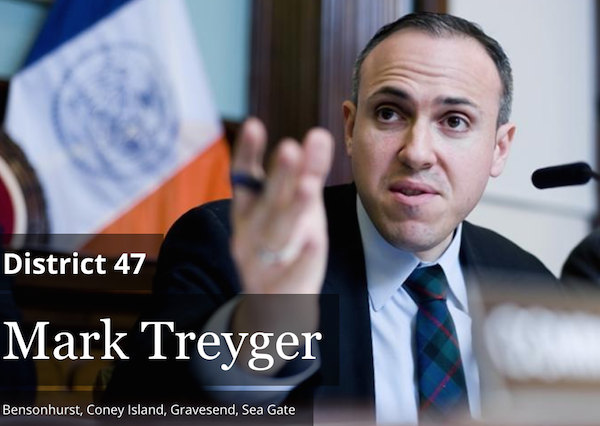Following an incident last month, in which two Brooklyn South Narcotics Detectives allegedly raped a teenage girl, City Council Member Mark Treyger (D-Coney Island, Bensonhurst, Gravesend) this week announced he intends to introduce legislation on the city level making it illegal for an NYPD officer to engage in sexual conduct with someone in the course of law enforcement activity.
According to media reports, the 18-year-old victim said Brooklyn South Narcotics Detectives Edward Martins and Richard Hall handcuffed her and took her to a Coney Island parking where one officer raped her and both forced her to perform a sex act.
The cops say the sex was consensual and their attorneys have been trying to discredit the teenage victim by invoking her behavior on social media.
But Treyger said the Sept. 15 incident was extremely disturbing to him, and the implications stemming from the incident has an effect on police-community relations.

“The Brooklyn DA’s office is actively investigating, and, reportedly, a grand jury has been convened to evaluate criminal charges against the two detectives involved. As the criminal investigation proceeds, however, we, as a community, need to have a conversation about the nature of sexual consent, and our expectations of both authority figures and victims of sexual assault,” said Treyger.
Under New York State law corrections officers can be charged with rape for having sexual relations with inmates because as incarcerated people they are incapable of giving consent. The same holds true for those under community supervision as they are incapable of giving consent to their parole officers, or in lockups in police stations.
However, there is a grey area for police on the beat. While it is against NYPD policy for cops to have sex on duty, there is no city law on the books making the behavior explicitly illegal to have sex with somebody they take into custody.
Treyger said besides introducing a bill making the behavior illegal on the city level, he is urging state lawmakers to work quickly to remedy this omission in the Penal Code.
“Our laws regarding sexual consent must be brought into line with basic common sense, empathy, and human decency,” said Treyger. “Everyone deserves to be treated with professionalism in the course of their interactions with the police; the abuse of power exercised by these two detectives rattles the foundations of positive police-community relations that the law enforcement community has been working to build.”
Treyger noted that victims of rape and sexual harassment already face significant barriers to reporting their assaults.
“As we have recently seen, this process may become more onerous when authority figures, from Hollywood producers to law enforcement, are the suspects. When police officers exploit the public trust to prey on individuals, it is particularly egregious,” said Treyger.
“Elected officials in New York City and State, myself included, must do more to ensure that our laws protect survivors of sexual assault, and hold police officers to the same standards as corrections workers and parole officers when interacting with the public.”










